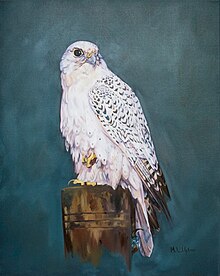messi87
Aspirante Falconiere
Ciao!
Volevo raccontarvi la mia esperienza al Falconry fair(per chi non lo sapesse è la piu grande fiera di falconeria in UK).
Prima di tutto devo un grazie enorme a Sue Evans , conosciuta su IFF,che mi ha aiutato in questi giorni e che ho scoperto essere "Membership Secretary British Falconers Club" ossia la piu grande associazione di falconeria in UK.
Dato che costava troppo andare in treno (140 sterline) le ho chiesto se c'era qualche falconiere della mia zona che andava alla fiera, e come risposta mi sono sentito invitare a casa sua per poi andare assieme a sei e al figlio(mio coetaneo) alla fiera.
Una volta arrivati sul posto mi ha presentato tutti i grandi falconieri inglesi (con i quali ho potuto fare amicizia....già mi pregusto un paio di cacciate con aquile e gyr ), ho assistito a delle dimostrazioni di volo in collaborazione col furetto e training( aquilone ecc) alimentazione dei falchi, mostre.
), ho assistito a delle dimostrazioni di volo in collaborazione col furetto e training( aquilone ecc) alimentazione dei falchi, mostre.
C'erano molti falchi[ibridi di tutti i tipi di gyr, perlin, merlin, aquile reali( a un certo punto il proprietario mi ha fatto tenere una femminona),aquila Verreauxii, code rossa, harrys, kestrel, avvoltoi, saker ecc).
Ma la cosa che mi ha colpito di piu è la Cultura(sono pieno di pubblicazioni che mi sono state regalate dal club che trattano qualsiasi aspetto della falconeria) e la sportività che circonda la falconeria inglese.
In piu mi sono potuto informare sulle leggi che regolano L'Arte e sono rimasto stupito che per fare falconeria non serve la licenza di caccia ma bisogna "solo" registrare il falco e seguire le leggi che mirano a mantenere la salute del falco e di come contestualmente il governo paghi i contadini per non coltivare interamente i campi( lasciano 6 m "sporco" rispetto al confine del campo e nelle siepi piantare bacche ecc) per permettere alla fauna di riprodursi proficuamente.
Altra sorpresa è stata la presenza di altri 2 falconieri italiani come P.C. e A.P.
Insomma, giornata TOP!!
Volevo raccontarvi la mia esperienza al Falconry fair(per chi non lo sapesse è la piu grande fiera di falconeria in UK).
Prima di tutto devo un grazie enorme a Sue Evans , conosciuta su IFF,che mi ha aiutato in questi giorni e che ho scoperto essere "Membership Secretary British Falconers Club" ossia la piu grande associazione di falconeria in UK.
Dato che costava troppo andare in treno (140 sterline) le ho chiesto se c'era qualche falconiere della mia zona che andava alla fiera, e come risposta mi sono sentito invitare a casa sua per poi andare assieme a sei e al figlio(mio coetaneo) alla fiera.
Una volta arrivati sul posto mi ha presentato tutti i grandi falconieri inglesi (con i quali ho potuto fare amicizia....già mi pregusto un paio di cacciate con aquile e gyr
C'erano molti falchi[ibridi di tutti i tipi di gyr, perlin, merlin, aquile reali( a un certo punto il proprietario mi ha fatto tenere una femminona),aquila Verreauxii, code rossa, harrys, kestrel, avvoltoi, saker ecc).
Ma la cosa che mi ha colpito di piu è la Cultura(sono pieno di pubblicazioni che mi sono state regalate dal club che trattano qualsiasi aspetto della falconeria) e la sportività che circonda la falconeria inglese.
In piu mi sono potuto informare sulle leggi che regolano L'Arte e sono rimasto stupito che per fare falconeria non serve la licenza di caccia ma bisogna "solo" registrare il falco e seguire le leggi che mirano a mantenere la salute del falco e di come contestualmente il governo paghi i contadini per non coltivare interamente i campi( lasciano 6 m "sporco" rispetto al confine del campo e nelle siepi piantare bacche ecc) per permettere alla fauna di riprodursi proficuamente.
Altra sorpresa è stata la presenza di altri 2 falconieri italiani come P.C. e A.P.
Insomma, giornata TOP!!



